By Andrew Cohen
Berkeley Law has enjoyed lofty success with the annual Skadden Fellowship, which funds exceptional young attorneys for two years of public interest work. But this year’s results soared to an even higher plateau.
Five current students and recent graduates have been awarded the coveted fellowship, second most among all law schools. Only three other law schools had multiple selections.
The firm Skadden, Arps, Slate, Meagher & Flom launched the program in 1988 to improve legal services for the poor and encourage economic independence. Of the 900-plus fellows it has funded, 90% remain in public service and almost all are still working on the same issues from their initial projects.
“I am thrilled that five Berkeley Law graduates and students have received prestigious Skadden Fellowships,” says Berkeley Law Dean Erwin Chemerinsky. “This so reflects our law school’s public mission and commitment to public service.”
Berkeley Law’s selections among the 29 overall Skadden Fellows are:
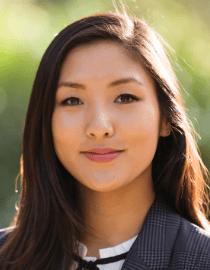
Sarah Chen ’18, who will work at the Texas Civil Rights Project in Austin, Texas. She will challenge Texas counties’ and cities’ 2021 redistricting where proposed maps would dilute the voting power of racial minorities, and ensure language access at the polls in counties with significant language minority populations.
A two-time judicial clerk, Chen says she was inspired to go to law school after working on a 2014 political campaign with voting rights attorneys who are now the Texas Civil Rights Project’s executive director and a senior staff attorney there (Mimi Marziani and James Slattery). “Another attorney on that campaign, U.S. Rep. Colin Allred, is also a Berkeley Law grad,” Chen says. “I’m especially excited because getting to work with Mimi and James in the trenches of Texas voting issues feels truly full circle.”
A child of immigrants, Chen launched the student group ElectionLaw@Berkeley in 2015, helped run a voter protection program in the 2016 general election, and helped draft the California Voting for All Act (passed in 2017), which provides some of the strongest language access at polls nationwide.
“I’m so grateful to have attended law school where students, professors, and staff are so devoted to public interest work and to building a positive community wherever they go,” she says. “I’m also so inspired by the other Skadden Fellowship recipients and their projects.”
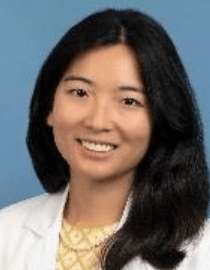
Theresa Cheng ’14, who will work for Bay Area Legal Aid in Oakland. She will provide civil legal services to homeless survivors of intimate partner violence in Alameda County, and partner with on-the-ground case workers and health care providers to form multi-specialist teams.
Her project comes at a unique and critical point in time as homelessness in California skyrockets and is exacerbated by the COVID-19 pandemic. An emergency physician, Cheng works at the nation’s fourth-ranked hospital in affluent West Los Angeles — and at a safety-net hospital in a low-income community.
Driven by her ER experiences to return to legal practice, Cheng sees every day how the pandemic “has laid bare the shortcomings of our healthcare system, our socioeconomic safety net, and the more insidious effects of an entrenched systemic racism.” She laments “how I discharge patients home from one hospital and pronounce patients dead in the other.”
Cheng notes that COVID-19 will only exacerbate these inequities, leaving more marginalized communities vulnerable to intimate partner violence and homelessness. “As a frontline doctor, I am only putting Band-Aids on broken healthcare and social systems,” says Cheng, who aims to “challenge the perception that medicine and law are siloed and vastly distinct.”
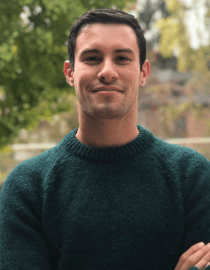
Isaac Flegel-Mishlove ’21, who will work for Centro Legal de la Raza in Oakland. Partnering with school districts, he will expand removal defense representation for low-income immigrants in the East Bay, focusing on students and families who are monolingual Indigenous-language speakers, unaccompanied minors, and geographically isolated communities in South Alameda County.
Flegel-Mishlove, who previously interned with Centro Legal’s immigration team, has worked with immigrants through a student-initiated legal services project, a pro bono delegation to Tijuana, the International Human Rights Law Clinic, and the Ninth Circuit Practicum. He has also taught language classes to Eritrean and Sudanese refugees in Tel Aviv, worked at a refugee protection and advocacy organization, and interned with the ACLU Immigrants’ Rights Project.
“People who are on the move — whether to seek safety, provide for their families, or escape climate change — deserve freedom of movement and redress for the injustices they have experienced,” he says. “My own ancestors came to the United States 120 years ago to escape anti-Jewish oppression and poverty.”
Since 2008, Flegel-Mishlove has spent part of each summer at a children’s shelter in an Indigenous community in Guatemala. He says Berkeley Law’s “commitment to social justice lawyering has facilitated my public interest path” and that “being able to pursue a public interest career is a privilege.”
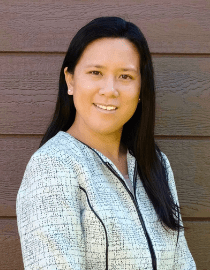
Molly Lao ’21, who will work for Legal Aid at Work in San Francisco. She will establish a medical-legal-social services partnership with a local one-stop resource and community health center to provide employment representation for formerly incarcerated individuals with disabilities in Fresno, where she was raised in a predominantly immigrant and refugee community.
“I’m especially excited to partner with the Fresno Center, a local one-stop center that provided my family with social services when I was younger,” says Lao, who notes that the Central Valley has 20-plus prisons and jails and has some of the nation’s highest rates of concentrated poverty. “It’s an amazing feeling to come back with years of education, work experience, and a newfound perspective on the resilience of the community in which I grew up.”
Before law school, Lao was a policy analyst at the California Workforce Development Board, analyzed public safety bills in the California Senate, and worked on First Lady Michelle Obama’s policy team. As a law student, she was a counselor with the Wage Justice Clinic, an advocate with the East Bay Community Law Center’s Education Defense and Justice for Youth team, and editor-in-chief of the Berkeley Journal of Criminal Law.
“I was able to meld all of my interests together at Berkeley to forge a career in civil rights law that I could have only hoped for,” Lao says. “I’m not surprised that Berkeley has so many Skadden Fellowship recipients this year … It shows how the many opportunities at Berkeley can help shape students’ interests in any public interest field.”
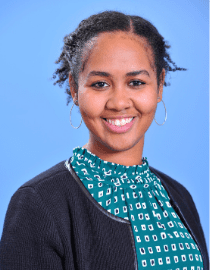
Candice Youngblood ’19, who will work for Earthjustice in Los Angeles. She will advance equitable transportation planning centered on the economic resilience and health of California’s low-income communities of color through regulatory and policy advocacy and litigation.
Asthmatic and the daughter of a late diesel truck driver, Youngblood grew up living at the intersection of three freeways in Los Angeles County. When she learned in college that Black children are more than twice as likely than white children to be hospitalized for asthma because they live on the frontlines of pollution, she was the only Black student in the room that day — and the case study illustrating that health disparity was her home community.
“Learning about the relationship between systemic racism and my ability to breathe changed my career,” says Youngblood, who recently got a major grant to launch a statewide youth leadership program focused on environmental health disparities. “Now that the pandemic has upended public transportation, leaving communities unable to access groceries and their jobs, transportation inequities have worsened. Local drive-thru testing sites are also inaccessible in spite of our communities’ high COVID-19 rates, which correlate with the respiratory illness rates.”
Her first job out of college was as a litigation assistant at Earthjustice when its Los Angeles office opened. “The attorneys there really invested in me and always provided learning opportunities beyond what my job description entailed,” she says. “They elevate their clients’ voices and show me the type of lawyer I want to be. I’m so excited to go back home to become that lawyer.”